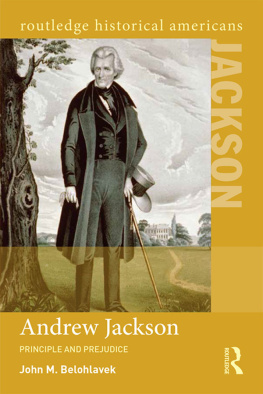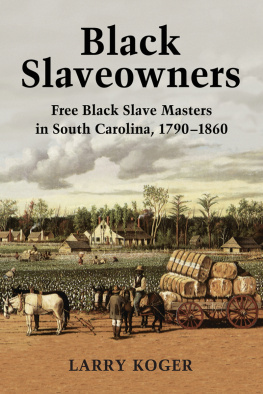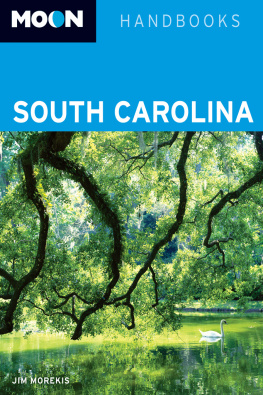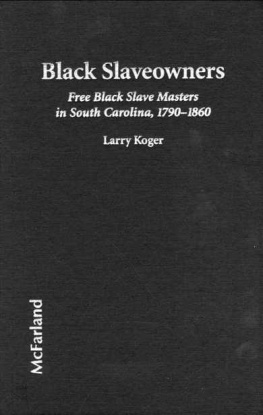About This Edition
This edition is made available under the imprint of DocSouth Books, a collaborative endeavor between the University of North Carolina at Chapel Hill Library and the University of North Carolina Press. Titles in DocSouth Books are drawn from the Librarys "Documenting the American South" (DocSouth) digital publishing program, online at docsouth.unc.edu. These print and downloadable e-book editions have been prepared from the DocSouth electronic editions.
Both DocSouth and DocSouth Books present the transcribed content of historic books as they were originally published. Grammar, punctuation, spelling, and typographical errors are therefore preserved from the original editions. DocSouth Books are not intended to be facsimile editions, however. Details of typography and page layout in the original works have not been preserved in the transcription.
DocSouth Books editions incorporate two pagination schemas. First, standard page numbers reflecting the pagination of this edition appear at the top of each page for easy reference. Second, page numbers in brackets within the text (e.g., "[Page 9]") refer to the pagination of the original publication; online versions of the DocSouth works use this same original pagination. Page numbers shown in tables of contents and book indexes, when present, refer to the original works printed page numbers and therefore correspond to the page numbers in brackets.
[Title Page Image]
[page iii]PREFACE.
IN aiming to arrest the attention of the reader, ere he proceeds to the unvarnished, but ower true tale of John Andrew Jackson, the escaped Carolinian slave, it might be fairly said that "truth was stranger than fiction," and that the experience of slavery produces a full exhibition of all that is vile and devilish in human nature.
Mrs. Stowe, as a virtuous woman, dared only allude to some of the hellish works of slaveryit was too foul to sully her pen; but the time is come when iniquity should no longer be hid: and that evil which Wilberforce and Clarkson exposed, and of which Wesley said it was "the sum of all human villainies," must now be laid bare in all its hellish atrocities. The half has not yet been told; but appalling as are the statements made, yet when the fiercest organized effort to extend the monster evil of North-American slavery is being made, every patriot is called on to sympathize over the woes and sufferings of human kind, and plead for freedom and liberty.
Cowper long ago told his fellow-countryman that
"Skins may differ, but affection
Dwells in white and black the same."
Therefore, kind reader, we ask your sympathy, while you peruse some of the iniquities perpetrated upon a suffering race, and that too often by men and women calling themselves Christians, and using a religious cloak to screen their monstrous, foul, and cruel acts.
Shrink not, gentle reader, when those fearful atrocities are brought before your notice. Such narratives as Jackson's are wanted to arouse the people. The evil is afar off, and interested parties say, "Don't believe it; it is false, or it is exaggerated." Not so; the worst cannot be told. You cannot speak out, or tell a fraction of the [Page iv] horrid scenes enacted, where every child and feeble woman is at the brutal mercy of brutalised man; where marriage is a fiction, and five millions of people live practically in a state of unrecognised whoredom and polygamy.
Would that English mothers and English daughters could feel as they ought for those whose virtue and honour, whose life and liberty, may be purchased by any libertine wretch, who has the "almighty dollar" in plenty in his pocket. Let us but think of our sisters, our wives, our children, and thank God with them, that
"I was not born a little slave
To labour in the sun;
To wish I was but in my grave,
And all my labour done."
Many an English reader, knowing that every year we pay a million of money as interest for the twenty millions by which the freedom of West Indian slaves was purchased, and spend nearly another million to keep down the slave trade of America, Cuba, and Brazil, are very earnest in declaring their abhorrence of American slavery, and, like the Times, finds fault with President Lincoln's government for not putting an end to slavery by proclamation, thinking that our British hands are quite clean. But they forget the share that England has had in the bondage of the human race. Liverpool and Bristol for years was the seat of the African slave trade; and, once upon a time, G. F. Cooke, the actor, on the boards of a Liverpool theater, when displeased with his audience for hissing him, turned fiercely on them, and told them that Liverpool was paved with the blood of the negro slaves; and in 1862 it is not quite clear of the same, vide the Nightingale Slaver.
Three hundred years ago Sir John Hawkins procured the first cargo of Negroes from the coast of Guinea, and took them to Hispaniola, and so profitable was his trip that a new expedition was soon prepared, of which Queen Elizabeth shared the profits. This royal patronage of the slave trade was further extended under other reigns, and, [Page v] on the 10th of December, 1770, our good King George issued a proclamation under his own hand, commanding the Governor of Virginia, "upon pain of the highest displeasure, to assent to no law by which the importation of slaves shall be in any respect prohibited and obstructed."
Before we then heartily condemn the United States, let us remember that when they would not have slavery, it was forced upon them by the English Government.
When in 1645 the ship of one Thomas Keyser and James Smith brought a cargo of negroes to Boston, they were heavily fined and compelled to return those negroes again to Africa. Noble men were they of Massachusetts; and despite the Irish and rowdy element of Boston and Portland, yet noble men are they at the present hour. There the fugitive slave has liberty and protection.
Virginia, long the battle ground of freedom during the old war, as well as the new one, often spoke out nobly against slavery. Her patriots, like Jefferson, though himself a slaveholder, yet steadily resented the influence of that growing evil. At that time, Franklin spoke through the press, and memorials from all the States were sent to King George. The king was inexorable; and while the English judges declared that when a slave set his foot on the soil of England he was free, yet the monarch stood in the path of humanity, and became the pillar of the American Slave Trade.








